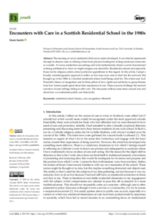The meaning of care in residential child care is under-developed. It can often be represented through its absence, seen as offering at best basic physical tending but lacking emotional connection or warmth. At worst, residential care settings said to be institutionally abusive can be characterised as being antithetical to what we might imagine care should be. Residential schools and especially those run by religious orders attract particular opprobrium in this regard.
In this article, the author adopts a broadly autoethnographic approach to reflect on how boys (now men in their late 40s and early 50s) brought up in the 1980s in a Scottish residential school recall being cared for.
The article uses Axel Honneth’s theory of recognition and its three pillars of love, rights and solidarity to group themes from how former pupils speak about their experiences of care. These accounts challenge the received narrative of such settings failing to offer care. The discussion reflects some ideas around care and about how we understand public care historically.

